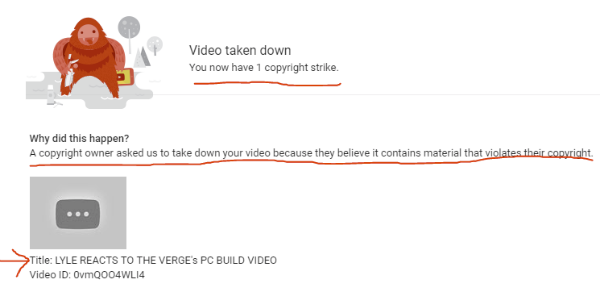[Most Recent Entries] [Calendar View]
Friday, February 15th, 2019
| Time | Event |
| 7:34a | EU Commission Portrays “Article 13” Opponents as a Misled and Misinformed Mob  This Wednesday the European Parliament and European Council agreed on the final text of the EU Copyright Directive. That, of course, includes the hugely controversial Article 13, which critics insist will lead to upload filtering, censorship, plus all kinds of unintended consequences that could change the shape of the Internet forever. Urgent claims have been made on both sides, including that the music industry could be brought to its knees if Article 13 doesn’t pass, and the Internet will break if the worst fears of the legislation come true. In the end and as predicted by many, it appears that the EU Commission sided with those claiming the former. A bigger surprise came from the EU Commission itself when it waded in Thursday with a stinging article of its own, one which implies that the millions who objected against Article 13 were misled and therefore misinformed. It was also a surprise to see the Commission itself suggest that “paid-for campaigns” were at least partly to blame. It has to be stressed that the Commission piece seems intentionally loose at times, perhaps to avoid direct accusations towards any particular company. However, when it begins by stating that searches for the ‘EU Copyright Directive’ on YouTube Pointing out headlines such as ‘Today Europe lost the Internet’, ‘How the new copyright laws will destroy the internet’, and ‘Censorship machines’, the Commission says that the campaign against Article 13 is being driven by “catchy slogans”, not the truth. It even manages to squeeze in what appears to be a reference to the UK’s decision to leave the EU. “Of course, we know from recent elections and referendums that simple memorable slogans — however untrue or unobtainable — can go a long way to winning over hearts, minds What follows is a familiar outline of why the Commission feels that Article 13 is needed, arguing that big tech companies such as Google/YouTube and Facebook shouldn’t be allowed to make money by placing ads against infringing content on their platforms. It then steps in to discredit the ‘meme ban’. “ Then, however, things begin to get a little more gritty. The Commission says that despite having overwhelming dominance online, the “largest search and video platforms” (fill in the blanks yourself) are “afraid of regulation”. Furthermore, these companies have skewed the campaign against Article 13 in their favor by “creating” (subtle sarcasm there, perhaps) “grassroots campaigns” to make it look and sound as if the EU is acting against “the will of the people.” That, the Commission says, is nonsense, because “unlike Google and Facebook, the EU is answerable to the public and to democratically elected politicians.” The underlying tone from the EU Commission is that meddling by tech giants led to members of the public being misled, stirred up, and forced into opposition over Article 13, but not based on the true facts. “So next time, when you get a sponsored message on your timeline, which says something like ‘the EU will kill the world wide web as we know it’, stop, pause and consider for a moment. Ask yourself: Cui Bono? Who really benefits from this message or this wider negative campaign?” the Commission adds. These comments are probably a little insulting to the people who have followed this from the beginning and have formed their own opinions based on solid research and facts as written in EU documentation. However, the EU Commission seems to believe that the majority have simply acted like sheep, herded up by US tech giants. “Do Google, Facebook or others really need to pay to persuade? Are we in a world where ordinary people side with the fire breathing dragon against the knight with a blue and yellow shield?” it asks. Some supporters of Article 13 are already celebrating the EU Commission’s piece as validation of their theories that this wasn’t a fair fight, that tech companies did indeed unfairly meddle in the process that led up to Wednesday’s agreement. The problem, however, is that this isn’t over yet, and the suggestion that people who opposed Article 13 are poorly informed may only serve to pour yet more fuel on the fire by infuriating everyone, informed or otherwise. Whether one agrees or disagrees with the Commission’s assertions, it might have been prudent to keep these opinions behind closed doors, at least until this is all over. The timing doesn’t seem great but pretty much nothing about this entire campaign has been.
Source: TF, for the latest info on copyright, file-sharing, torrent sites and more. We also have VPN reviews, discounts, offers and coupons. |
| 2:59p | Vox Targets The Verge Critic With Dubious YouTube Takedown
The site has repeatedly highlighted problems with YouTube’s Content-ID and copyright takedown system. Just this week it reported how YouTube is being used for extortion scams, an issue that we covered last month. The site also covered the Article 13 plans in the EU, with a headline stating that it threatens the Internet as we knew it. Given the above, it’s surprising that a video from The Verge is now at the center of the latest YouTube copyright takedown mess. The trouble started earlier this week when YouTuber Kyle was informed by YouTube that one of his videos was removed following a takedown request from Vox Media, the parent company of The Verge. Kyle allegedly infringed the copyrights of The Verge’s “PC Build Video,” which was published last year. The video in question has been widely criticized as the “how to” made several crucial mistakes, according to experts. The accompanying The Verge article remains online today, with corrections, but the video in question was pulled from YouTube. However, the numerous reaction videos, in which YouTubers responded to the mistakes, are still up. This included Kyle’s response video, which is typically covered by fair use. But, apparently, Vox saw reason to take it down. Not by some automatic Content-ID claim though. No, this was an actual takedown notice, which is typically done manually and results in a ‘strike’ on the channel.  The precise reason for the takedown is unclear but many people believe that Vox was trying to bury the negative responses. If that’s the case, it would be a typical example of takedown abuse, something The Verge may want to look into. If burying the criticism was the goal this certainly backfired, since what we have now is a typical example of the Streisand Effect. All of a sudden, hundreds of thousands of eyeballs are being drawn to the not-so-accurate how-to video, generating even more negative responses. Paul’s Hardware has a good overview of the original video, the response, and the early aftermath, and many others have jumped on the story since.
The good news is that all the public outcry has paid off, for Kyle at least. He filed a counter-notice and the video was swiftly restored. According to Kyle, YouTube sent the following message to The Verge.
“Hi The Verge, We are very concerned that your copyright notification may not be valid for some or all of the videos identified in your notification.”
TorrentFreak reached out to Vox Media for a response but thus far we haven’t heard back. In the meantime, here’s the now-uncensored video in all its glory.
The now uncensored video
Source: TF, for the latest info on copyright, file-sharing, torrent sites and more. We also have VPN reviews, discounts, offers and coupons. |
| 4:21p | ACE Sues Cord-Cutting Service “Omniverse” For Copyright Infringement
While some of these offer access legally, that’s certainly not always the case. The unauthorized services are a thorn in the side of mainstream entertainment industry companies, which are trying hard to address the problem. The Alliance for Creativity and Entertainment (ACE) has been particularly active on this front. The anti-piracy partnership between Hollywood studios, Netflix, Amazon, and more than two dozen other companies, has filed lawsuits against several services already, and this week they add a big one to the list. In a complaint filed at a Federal Court in California, ACE accuses the US-based company ‘Omniverse One World Television’ and its owner Jason DeMeo of copyright infringement. Omniverse doesn’t offer any streaming boxes but sells live-streaming services to third-party distributors, such as Dragon Box, HDHomerun, Flixon TV, and SkyStream TV, which in turn offer live TV streaming packages to customers. “Defendants operate at a higher level in the supply chain of infringing content—recruiting numerous downstream services like Dragon Box into the illicit market and providing them with access to unauthorized streams of copyrighted content. “Defendants function as a ‘hub’ of sorts, with the enlisted downstream According to the official website, Omniverse includes more than 70 top US TV channels and 8 premium channels. However, ACE and its members allege that some of the channels are offered without proper licenses. As such, they are illegal. “Omniverse’s illegal services, and the downstream ‘Powered by Omniverse’ entities, undermine the legitimate market for legal and licensed services, a harm that has grown as Omniverse has expanded,” ACE spokesperson Richard VanOrnum informs TorrentFreak.  Omniverse’s owner Jason DeMeo previously insisted that his company had acquired the rights to stream some channels in the US. However, in an interview with Cord Cutters News, he was not willing to share any details on the underlying contract. The complaint clearly disputes this, stressing that Omniverse and all “Powered by Omniverse” services are operating illegally. “Plaintiffs have not granted licenses that permit Defendant DeMeo or According to ACE, the public has plenty of options to watch movies and TV-shows through official channels, with 140 legal online services for film and TV content is the US alone. The movie, TV show, and distribution alliance is now asking the California court for an injunction to shut down the infringing service and impound all hardware. In addition, they’re requesting statutory damages which can go up to several million dollars. MPAA CEO Charles Rivkin comments that lawsuits like this one are needed to protect the livelihoods of millions of people who depend upon a healthy film and television industry. “I’ve seen firsthand how creators are economically harmed by piracy enterprises, which is why today’s ACE litigation – and the MPAA’s work helping make it happen – is another strong step forward protecting the rights of artists,” Rivkin says. We also reached out to Omniverse for a comment on the allegations but at the time of writing, we have yet to hear back. The Omniverse website, meanwhile, remains online. — A copy of the ACE complaint against Omniverse is available here (pdf). Source: TF, for the latest info on copyright, file-sharing, torrent sites and more. We also have VPN reviews, discounts, offers and coupons. |
| << Previous Day |
2019/02/15 [Calendar] |
Next Day >> |

 Streaming set-top boxes and IPTV services have been selling like hot cakes over the past several years.
Streaming set-top boxes and IPTV services have been selling like hot cakes over the past several years.